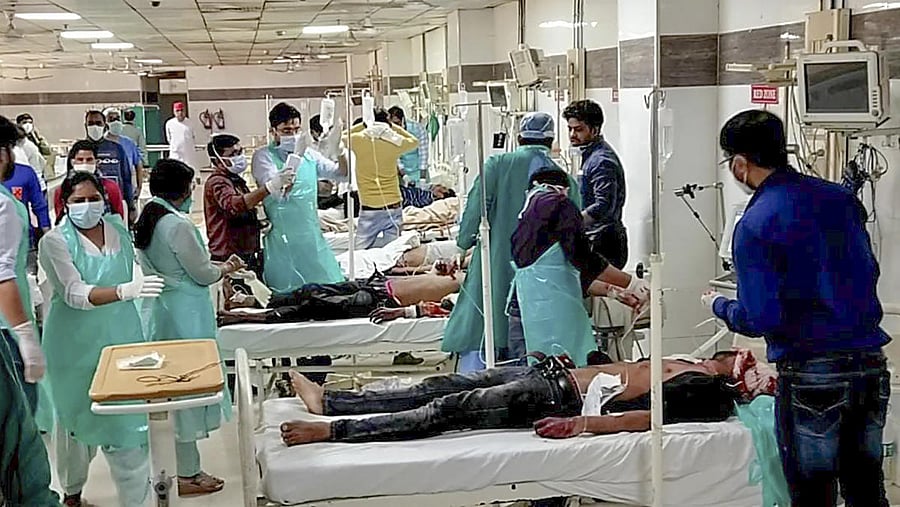
The scourge of Antimicrobial Resistance (AMR) is approaching us faster than we expected. For starters, AMR occurs when our existing antibiotics and other antimicrobials stop working against new forms of bacteria, also called superbugs.
In 2019, it has already directly killed over 1.27 million across the world, mostly in low and middle-income countries, according to a recent study published in Lancet. This is bad news because the magnitude of damage that was projected to happen in 2050 on account of AMR has already occurred in 2019, according to this estimate. And this estimate doesn’t even factor in the impact of indiscriminate popping of antibiotics in the last two years of the pandemic.
As we battle the third wave of the pandemic in the country, the government has been repeatedly urging people to avoid indiscriminate use of drugs as it can have grave consequences. In a different context, what overuse of drugs can precipitate has already been witnessed in the second wave of the Covid-19 pandemic that saw the outbreak of fungal infections such as mucormycosis in India, most likely because of overconsumption of steroids.
‘Unwarranted’ and ‘wanton’ use of medications including antibiotics such as azithromycin and doxycycline has been warned against by a group of doctors in an open letter in January, who reviewed prescriptions of the last few weeks given to Omicron-infected patients and urged the government to ensure that our mistakes of last year are not repeated.
Irrational prescription of antibiotics became commonplace globally as Covid-19 spread. The world over, around 55% to 98% of hospitalised patients were administered antibiotics despite only a fraction having bacterial co-infection, global studies have shown.
Researchers from Washington University found that Covid-19 likely contributed to 216.4 million excess doses of antibiotics for adults and 38 million excess doses of azithromycin for adults from June 2020 through September 2020, the peak of Covid-19 in India, which led them to conclude that almost everyone who caught the virus probably popped antibiotics.
These surveys indicate that even the current dire estimates on the impact of AMR may have to be revised upwards when the exercise is done for the pandemic period after considering the misuse of antibiotics during the Covid-19.
Before the advent of the Covid-19 pandemic, the government had announced a series of measures to arrest the spread of AMR. To tackle AMR, within the framework of ‘One Health’ approach, the government enacted the National Action Plan on AMR (NAP-AMR) in 2017.
It has been supplemented by other initiatives like the ban on colistin in the livestock and poultry industry, and the Red Line Campaign to curb the over-the-counter sale of antibiotics. Further, to improve the detection of resistant bacteria amongst patients, the National Centre for Disease Control (NCDC), Pune, has decided to transform eight labs across the country into antibiotic research hubs.
Paramount importance is also being given to the development of new antibiotics under the Department of Biotechnology (DBT) and Biotechnology Industry Research Assistance Council (BIRAC) AMR Mission. But the moment the pandemic stuck, action on many of these measures went to the backburner, and understandably so. The government had to focus on activities to minimise the devastation caused by the Covid-19.
AMR is a complex issue with several drivers across animal, human and environmental ecosystems. It increases due to the overuse of antibiotics by humans and misuse of antibiotics in the animal, agriculture, and livestock sectors.
While a lot of directives have been issued to limit animal and human AMR, mitigation of environmental AMR needs to be understood better and action on this front should be prioritised. The country has witnessed several instances of pharma pollution such as that of Baddi pharma hub and the consequent pollution of Sirsa river or the discharge of effluents into the sea by the pharmaceutical companies of Andhra Pradesh. Various studies have reported the presence of antimicrobial-resistant bacteria and their genes across the water sources in the country.
Researchers at the Indian Institute of Technology, Gandhinagar, found increased resistance to antibiotic drugs amongst microbes in the wastewater across sewage treatment plants along the Sabarmati River and lakes in Ahmedabad. Another study found various levels of E Coli resistance to third-generation cephalosporin in groundwater and surface water used for drinking and recreational purposes across India. Given that India is one of the largest producers of drugs, it should be worked out how the standards governing antibiotic discharge can be implemented without completely choking the growth of the pharma industry.
To plug these gaps in the AMR mitigation efforts and deal with them holistically, our country can learn a lot of lessons from the Covid-19 vaccination drive.
The drive succeeded beyond expectations because of unprecedented multi-stakeholder collaborations, such as between various central ministries, the central and the state governments as well as between the government and the private sector. Thus, the policymakers must plan convergence across relevant sectors on AMR. The formation of a task force on the lines of the National Authority on Containment of AMR (NACA), as suggested by NAP-AMR, would be a step in this direction.
The sudden upsurges during the pandemic taught us the importance of evidence-based policymaking, the consequences of steroid overuse during the second wave caused by Covid-19 showed how harmful overmedication can be to health and the vaccination drive reiterated the success of convergent efforts. Using these lessons in shaping the future course of actions will help us arrest the spread of AMR. We, as humanity, cannot let a crisis like Covid-19 go to waste.
((The writer is a BJP MP representing
Ahmedabad West)